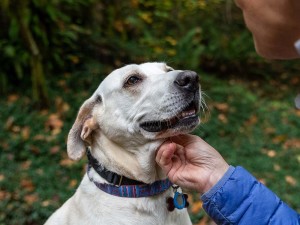Fidocure — A New Approach to Canine Cancers
Providing vets, pets and their people with a better way to do chemotherapy and radiation.
Cancer is the word no one wants to hear in connection with themselves or their loved ones, including their dogs. Yet, statistics show that one in four dogs will be diagnosed with some form of cancer in their lifetimes and that people and dogs develop cancers at about the same rate. Fortunately, science, technology, and human determination are at work, looking for ways to improve the odds in our collective favor.
Canine Cancer Treatments
With most cancers, time is of the essence. If we can’t get our dogs in to see the vet when symptoms present themselves, or if it takes four to six weeks to schedule treatment once a cancer’s been diagnosed, outcomes in terms of longevity or quality of life are unlikely to be what we’d hope for.
Snap a pic of your pup’s teeth, and GREENIES™ will help you spot potential signs of oral health issues.
However, an approach launched by a California biotech company seems to be tailor-made for these complicated times. A year ago, One Health—a company that describes itself as “bridging the gap between canine and human cancer therapeutics”—introduced FidoCureopens in new tab ®, a targeted treatment that uses genetic testing to identify cancer-causing mutations and then provides a customized therapy to attack the cancer cells. The treatment, delivered in pill form, can be given at home; according to the company, it’s “cheaper than chemo and is the first human-grade treatment provided to dogs.”
It’s called precision medicine, and it’s an approach that’s been used to treat cancers in people for some time—but not so much for veterinary cancers, where chemo and radiation are still the norm. Ironically, as Cheryl London, DVM, PhD, DACVIM (Oncology) of Tufts University (and a FidoCure veterinary advisor), observed, “There’s usually a large body of safety data on targeted therapies for humans, and by and large, much of the testing is done in dogs.”
How much do you spend on your pet per year?
Because humans and dogs are known to develop similar cancersopens in new tab, researchers frequently study one species as a model for the other. For example, the National Cancer Institute has been running canine-focused clinical trialsopens in new tab as part of their comparative oncology studies for more than two decades, identifying treatments that preserve dogs’ quality of life and are translatable to treatment of human cancers.
According to Christina Lopes, FidoCure CEO, targeted therapies have another big advantage over chemotherapy: “Whereas chemotherapies kill all rapidly dividing cells indiscriminately, targeted therapies inhibit the growth of just those cells with a given mutation.”
What is FidoCure’s Success Rate?
While new data is expected to be published later this year, One Health says that many of their dogs are living longer than expected with traditional cancer treatments. In their initial group of 38 dogs considered terminal, 24 of those 38 dogs (63%) are still alive, having been treated between two and 13 months ago.
How Does FidoCure Work?
The vet, usually a veterinary oncologist, sends a tissue sample to FidoCure for DNA sequencing in a CLIA-certified lab. From this, a personalized report—specific to the individual dog and the type of cancer—is generated, identifying mutations that may affect treatment and recommending FDA-approved cancer drugs. (With one exception, all veterinary oncology drugs were originally developed to treat human cancers. They can be prescribed “extra-label” for pets thanks to the Animal Medicinal Drug Use Clarification Act of 1994, which allows vets to use FDA-approved drugs to treat pets without going through additional regulatory steps.)
The company works with an FDA-approved compounding pharmacy to develop appropriate dosages for the drugs. The pharmacy titrates the drugs to the specific needs of the canine patient, including sometimes adding flavors (reportedly, beef liver is quite popular). Most pet insurance plans cover this treatment.
The FidoCure therapy “is intended for patients whose tumor has a specific gene mutation that can be mapped to a precise therapy.” It’s also being used for patients whose cancer did not respond to other therapies, has spread or is inoperable. While all cancers are eligible for FidoCure, the company reports that, to date, hemangiosarcomas have made up most of the cases, along with bladder cancer and some rare canine cancers such as histiocytic sarcoma. According to the company, roughly half the cases they’ve seen came to them when the patient’s cancer didn’t respond to traditional therapies.
One Health also does its part to complete the benefit loop by applying data from patient outcomes and genomic investigations to human cancers. For example, as Lopes says, “We might examine a mutation and biomarker in a dog that’s in a different location than a human, but the data may still be relevant.”
Signs & Symptoms of Cancer in Dogs
According to the AVMA, the following may indicate your pup should be checked out by your veterinarian without delay.
• Abdominal swelling.
• Bleeding from the mouth, nose or other body openings.
• Difficulty breathing.
• Difficulty eating.
• Lumps, bumps or discolored skin.
• Non-healing wounds.
• Persistent diarrhea or vomiting.
• Sudden changes in weight.
• Unexplained swelling, heat, pain or lameness.
• Visible mass/tumor.
More refinements in companion animal cancer-fighting are either here or on the horizon. Elias Animal Healthopens in new tab has developed a treatment platform they describe as utilizing a combination of cancer vaccination pretreatment and activated “killer” T cell immunotherapy. And at the Cornell College of Veterinary Medicine, a study of a type of lymphoma common to both people and dogs is in progress. According to a story in the Cornell Chronicleopens in new tab, “If the project is successful, it may one day allow oncologists to use a patient’s metabolic profile—as well as the DNA of the tumor—to design a precision medicine treatment plan. Genetic data shows what mutations a tumor has, but metabolomics reveal what is actually happening inside the cells.”
From where we sit, FidoCure is part of the vanguard providing veterinarians with more sophisticated tools, ways to better understand their patients’ specific medical needs and to treat them more effectively—demonstrating that, once again, dogs are not only our best friends and co-pilots, but also, part of the solution to health problems that potentially affect us all.








